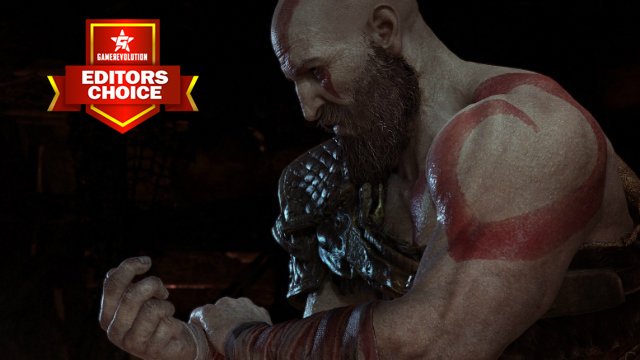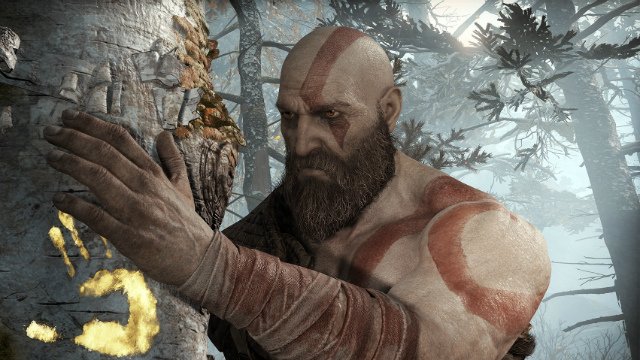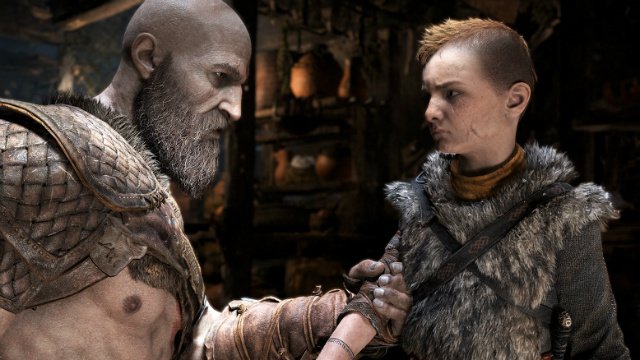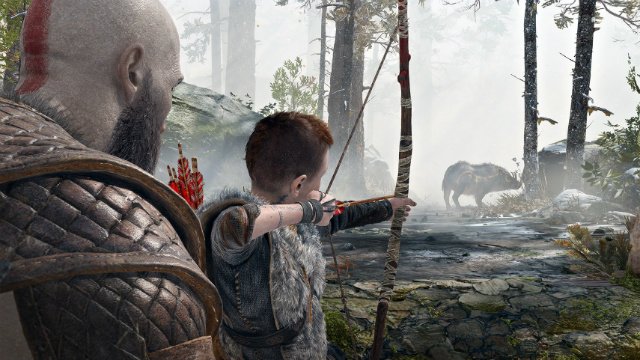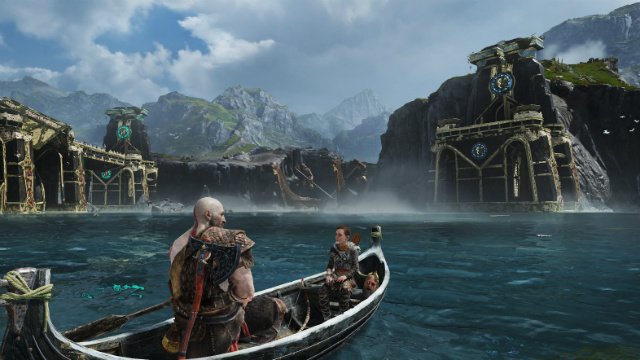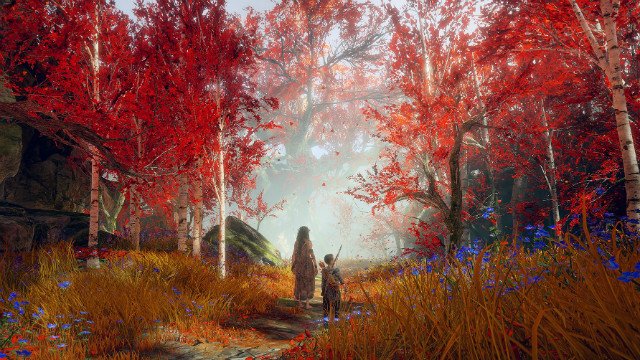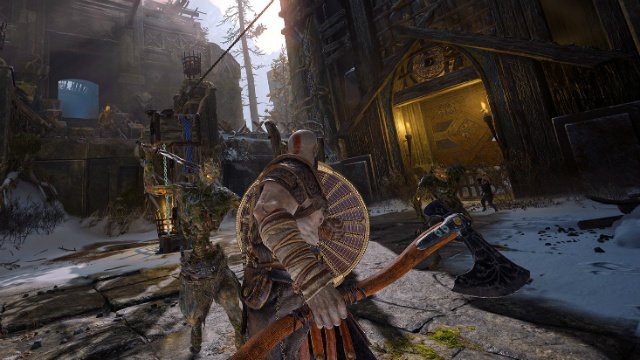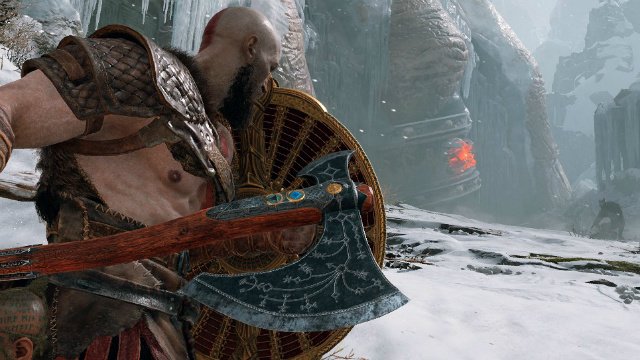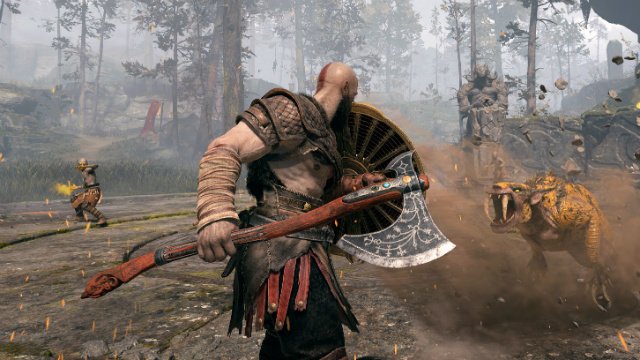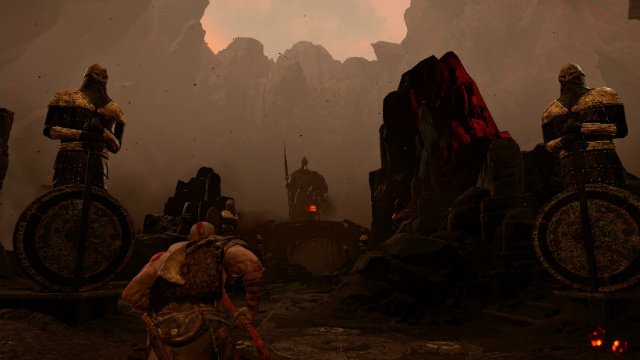Almost every console has a defining game, one that comes to mind whenever you think about the platform. These are the Marios and Halos of the video game world, the exclusive games that sell systems. While no one could argue that the PlayStation 4 doesn’t have a sizable collection of quality exclusives, its library has been missing that magical title that makes gamers everywhere pause in reflection. A game that transcends all fan bases and attracts aficionados of any genre.
Well, that game is finally here. God of War (2018) is an amalgam of the best of everything PS4 has to offer to this point. It perfects current-gen gameplay conventions and introduces it’s own twists that we’ll see replicated in games for years to come. God of War is the Breath of the Wild of the PS4, and it’s joined the handful or so of exclusive titles that alone are worth the price of the console.
God of War Review: Ghost of Sparta
SIE Santa Monica has crafted an utterly amazing world in God of War. Part of this is because it’s rooted in Norse mythology and has a vast pool of legends to draw from. Sometime after God of War 3, Kratos pulled up his stakes and moved from Greece to Midgard. Instead of Zeus, Athena, and pals, Kratos now has to worry about the likes of Odin, Thor, and Baldur.
However, instead of leaning entirely on the old tales, the writers have taken liberties with the legends here and there to weave the story of Kratos and his son Atreus into Norse mythology in a way that makes it feel as though they were always there. Additionally, SIE Santa Monica made this game with the idea in mind that those who have never played a God of War game can enjoy and understand it just as well as someone who has played all of them. It’s sort of a soft reboot (thus the God of War moniker instead of God of War 4) in that it doesn’t rely heavily on previous knowledge of the series, but longtime fans of the series will enjoy the references to previous events in Kratos’ life..
The game begins with Kratos cremating the remains of his wife, Faye. Faye’s last wish was to have her ashes scattered from the highest mountain in all the realms. Sad, but a pretty simple objective, right? Unfortunately, Kratos may have run from Greece, but he can’t run from his godhood, and there are plenty of people in the Norse realms that aren’t particularly happy about a stray god traipsing about.
God of War Review: Father and Son
At center stage in the game is Kratos’ relationship with his son. Kratos was a terrible father in Greece, and he didn’t do a much better job in Midgard. His relationship with Atreus is strained at best, and without Faye to stand as a medium between them they’re forced to directly interact with each other for an extended period for the first time.
The two’s journey together is a struggle in multiple ways. Dealing with the loss of a wife and mother is hard enough on its own, but their histories make the going even tougher. Kratos, though older and wiser, still has a lot of difficulty with the concept of family. Not only did he kill his family due to Ares’ trickery, but his relationship with his own father and mother, Zeus and Callisto, was far from healthy. Because of Kratos standoffish demeanor, Atreus struggles to feel accepted by his father and doesn’t think he’ll ever be strong enough to make him proud.
Watching the two grow throughout their journey is incredibly rewarding, and measures up with pairings such as Ellie and Joel or Lee and Clementine. The writing and acting bring out the bond between father and son and drive home the moments when it’s strengthened or strained. Atreus, while mature for his age, is still a young boy and watching Kratos teach him how to be a man, and how the world works is heartwrenching.
God of War Review: Player Agency Not Required
Though you control Kratos, both he and Atreus are the main characters of the game, and part of what makes God of War so great is the fact that you’re made an audience to their struggles. Neither of them is an avatar for the player; this is their story and not a choose-your-own-adventure game.
Just because you want Kratos or Atreus to do something doesn’t mean it’s going to happen. They do things according to their own personalities, regardless of how bad an idea it is. Some might be turned off by this “lack of player agency,” but I think that’s rubbish. After all the sandbox, open-world games that get released, I’m always thrilled to play a game with a strong lead role instead of some nameless protagonist making shallow, insignificant decisions.
Instead, everything in God of War makes sense in the context of the world it takes place in. Almost nothing remains unexplained, down to fast travel and why the dwarven shopkeepers can be everywhere at once. Some games would suffer greatly by taking player choice out of the equation, but by closing the world to direct player influence, God of War is able to weave a fantastic plot and build an incredible world without having to worry about what’s going to happen if you randomly kill an NPC.
God of War Review: The Nine Homeworlds
Just because the plot of God of War is linear though, doesn’t mean there’s not exploration and open-world design. At key parts during the game, you’ll get the opportunity to break aware from the main quest for a while and explore Midgard and some of the other Norse realms.
The great thing about the exploration in God of War is that you can participate in it as little or as much as you want. There are tens of hours of optional exploring and side questing you can do that will reward you with powerful armor and enhancements along with a ton of lore and backstory about the world you’re in. If you’re just interested in the story though, you can stay on the path and move on.
An excellent design decision in God of War is that during many main plot points the game keeps you on task. If you need to hurry somewhere, the game locks you into that course of action so you won’t get distracted. This allows God of War to have the best of both worlds: an urgent and linear main quest and plenty of open-world exploration and side quests if you so choose.
The pacing of how the world is revealed is excellent in God of War. At first, you don’t even have a compass. The game makes you figure out the basics without assistance and gradually introduces mechanics before doing so becomes cumbersome or irritating.
Fast travel too, isn’t available from the start, and for most of the game, you can only fast travel to one centrally located area. As a result, you have to actually traverse the world on foot and by boat and take it all in instead of going to a menu and changing location every five minutes and waiting for a loading screen. Some players may find this irritating, but I really enjoyed how it set the pace for most of the game, and by the end, I felt like I had been on a real journey because of it.
The pace of exploration is kept nicely as well. There are key events in the game that open up new areas to explore and new ways to get past certain obstacles. This means that you might complete exploring most of an area early in the game, but not have the means to open a door or create a path to the last part of that area until late in the game. This kind of keeps you filled with a sense of anticipation, wondering, “when will I get to see what’s behind that door?”
God of War Review: A Visual Cornucopia
Midgard is by far the largest area to explore, and where most of the game takes place, but you’ll gain access to five other realms as well. The Norse realms exist layered on top of one another, so each one is a different version of the other eight. This means that some are filled with cold winds while others are teaming with magma and spewing molten rock. All of these changes in scenery look amazing on the PS4, and with 4K and HDR this game goes a step beyond what even games like Horizon Zero Dawn showed us was possible on this platform.
Beyond crisp resolution and stunning HDR colors though are the incredibly detailed textures. Your journey takes you through a lot of different environments, and the texture work in God of War really brings them to life. As I was playing through the main quest, I didn’t notice it so much, but as I was going back and completing the side quests and exploration I hadn’t finished yet, I took the time to really look at the scenery.
Run-of-the-mill environmental aspects like dirt, water, and snow all look great, but it’s the buildings and statues that show how much love SIE Santa Monica put into this game. You’ll see temples with golden decor all about, all engraved with ridiculously intricate scrollwork and runes. The detail throughout the game is consistent and astounding, and even the most inconsequential areas seem to have had special care taken with them.
Somehow the God of War displays all these visuals without any loading screens in-between areas. After the initial game load, you’ll never have a big black screen take you out of the action. Of course, this is mostly due to some clever programming tricks. Instead of a loading screen, you may have to paddle your boat through a narrow tunnel to the next area or wait for a piece of enchanted machinery to cycle.
However, I’d much rather remain in control of a character, even if it means you’re just doing something mundane like riding an elevator. These disguised loading periods are also often punctuated by conversations between Kratos and Atreus about the state of the world or Kratos’ past. It gives a chance for some exposition during a time most games would just have a loading screen displayed, and keeps your head in the game instead of sighing and waiting for the next opportunity to play.
God of War Review: Battling the Gods
There are plenty of undead (and living) foes that stand between Atreus and Kratos’ objective. The God of War games are known for their hack-and-slash gameplay, but this time around things are a bit more measured.
Most of the control in the game is over Kratos, though you can also call on Atreus to assist you with his bow. Kratos’ starting weapon is the Leviathan Axe, which works a lot like Mjolnir. You can throw it and have it instantly fly back into Kratos’ hands. You’ll also have access to a retractable shield and, of course, Kratos’ fists.
The combat in this game is similar to Horizon Zero Dawn, though it tends to play out fast and against more numerous and more powerful foes than that game. Enemies in God of War usually have two meters: health and stun. While the most straightforward way to kill an enemy is to drain their health to zero, you can also stun them with specific attacks. If you manage to fill the stun gauge enough to daze an enemy, Kratos can attack them for massive damage.
The interplay between Kratos ax, fists, and shield, and Atreus’ bow makes for an impressive fighting system, one that when mastered will have you truly performing godlike acts of martial skill on-screen. Throwing your ax into a far-off Draugr for the kill, then stunning a nearby one and ripping it in half before calling back your ax to carve through a third enemy looks amazing and gives you a real feeling of power.
As you continue through the game, both Kratos and Atreus gain new skills that add to the utility of their weapons. Kratos starts the game with some basic moves and the ability to throw his ax. However, by the time you reach the end, you’ll have acquired extra techniques that allow you to chain together devastating combos. If you put some time into learning the different combinations of attacks, you can eventually get to the point where most enemies can’t even touch you as you pull off infinite combos that kill just about anything that gets near.
God of War Review: Arms and Armor
At the beginning of God of War, you’ll likely find one or two enemies difficult to take on, but there’s plenty of equipment to locate and craft that feeds into the games stat system. For the most part, an item’s power is dictated by its rarity, with Epic gear being the best.
However, sometimes you’ll be better off wearing an upgraded piece of lower-tier gear than a fresh piece of Epic gear. There are also enchantments that bestow bonus effects when socketed into armor and weapons that give you beneficial effects like increased sprint speed or resistance to burn damage.
Crafting new armor and enhancement items is a big part of why exploration and side quests in God of War are important. For going out of your way, you’ll often get access to a new item or crafting ingredients which will give you a mighty boost over what you’re currently wearing or let you upgrade your current equipment even further. Though like I said above, you can altogether skip out on all of this. The game rewards you with enough armor and enchantments as you play through that you can forgo the crafting system if you want.
God of War Review: Genre Problems
Unfortunately, God of War shares some of the issues that other third-person action games do. In fact, these problems are so widespread that I didn’t even end up counting them against this game in particular.
During combat, it can be difficult to control the camera and keep a bead on the enemies you’re fighting. If you’re fighting a large number of foes or a particularly fast one, it’s not hard to lose track of them and take damage that you really shouldn’t have. There’s a lock-on function that helps this somewhat, but I found it a bit too sticky and using it was often more detrimental than helpful.
God of War does have among the best controls I’ve seen in a third-person action game, though. Until humans can get a third arm grafted on to control the camera independently or someone comes up with a better controller idea than the standard configuration all three consoles use right now, then this is about as good as it’s going to get.
God of War Review: Difficulty For Everyone
The game has four difficulty settings, and I played on “Give Me a Balanced Experience” which corresponds to the Normal in most games. I found the combat challenging, but fair, and didn’t have an issue making it through most of the game without getting frustrated. I will say some side bosses are absolutely brutal and will try you even with a tricked out Kratos and Atreus.
For those that want more of a challenge there’s also “Give Me a Challenge” (hard) and Give Me God of War (very hard), and for those who want a lighter experience, there’s “Give Me a Story (easy). For the first three difficulty modes you can change the difficulty at will, but for the hardest mode, you’re locked in for the duration. The difficulty setting seems to influence enemy AI, health and strength instead of limiting item usage or changing item placement, so it should only really affect how tough combat is.
These aren’t the most robust difficulty options I’ve ever seen in a game, but they don’t have to be. Gamers who want a challenge have the opportunity to play through the game in that manner, and those who are in it for the story both should be satisfied with the options presented in God of War. If you want some extra difficulty, or you just don’t want a HUD, there’s an immersive mode available that lets you turn on and off parts of the HUD at will. In fact, it’s entirely possible to play through the whole game with a minimal or no interface.
God of War Review: A System-Seller
[springboard type=”video” id=”1735565″ player=”ga027″ width=”640″ height=”387″ ]
I’ve never given a game a perfect score before, and I thought long and hard about whether or not God of War deserves it. No matter how much I enjoy a game, typically there are at least a few moments where I get frustrated or bored, but not with this one. It’s possibly the best example of what the PS4 has to offer, and I feel like it’s going to be one of those games that instantly comes to mind when they think of this console generation.
The graphics, sound, combat, world, and plot all come together to make an exquisite package that is a prime example of why games are art and God of War is right up there with the best films and novels when it comes to storytelling. If you have a PlayStation 4, you should play God of War. If you don’t have one, you should consider getting one to play this game.
PS4 digital review copy was provided by the publisher. Game was reviewed on PlayStation 4 Pro connected to a Samsung KS8000 at 4K with HDR enabled.
-
Wonderfully developed world based on Norse mythology.
-
Excellent main story with great characters.
-
Tons of side content that further develops the lore and setting of the game.
-
Excellent combat with engaging skill tree and combo system.
-
Crafting is rewarding but optional.
-
Textures are beautifully detailed and makes good use of HDR.
-
Camera can be finicky with large groups of enemies and particularly speedy foes.
